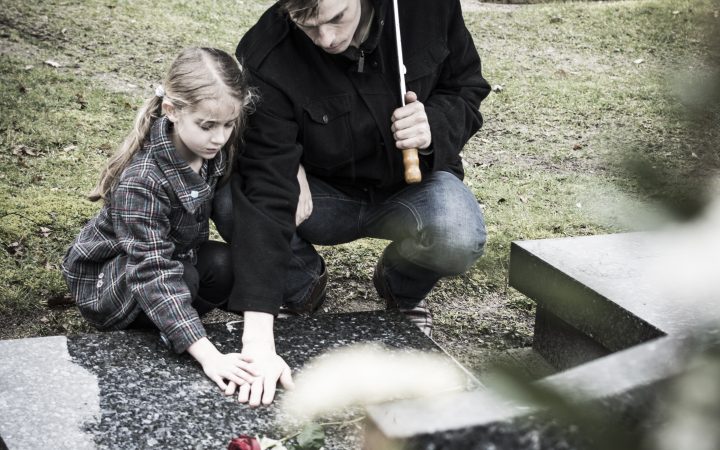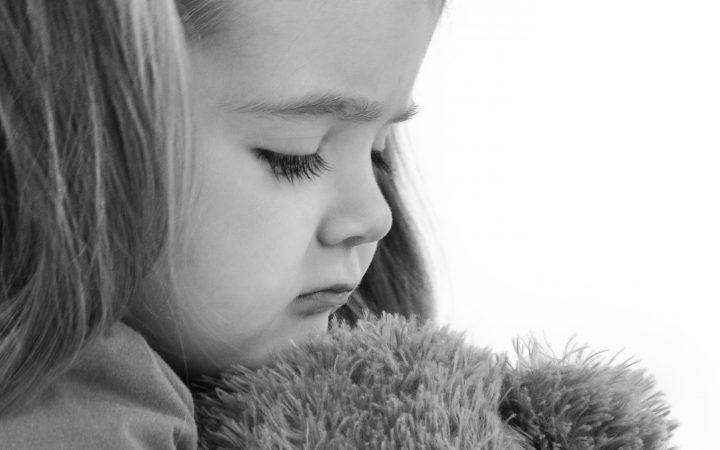Talking to Kids about Death

Gina’s father just passed away having lost his long battle with cancer. She is devastated but even harder is trying to decide what to do about her children, ages 8, 5 and 2. Some of her friends are telling her to keep the children away from the funeral while others are insisting that it is important to include them in some way. Gina, reeling from her loss, doesn’t know what to do and doesn’t have a great deal of energy to figure it out. She feels confused and overwhelmed by everything that’s happening around her.
No one wants to talk about issues related to death and dying. We especially don’t want to have to talk about it with our children. As Christians, however, the month of November, with the Feasts of All Saint’s and All Soul’s Days, gives us a wonderful opportunity to take charge of our fears and teach our children some important lessons about life, loss, and God’s abundant love.
What is Death?
We were not created to die. The Catechism states that it was not God’s intention that we would experience bodily death.
“Even though man’s nature is mortal, God had destined him not to die. Death was therefore contrary to the plans of God the Creator and entered the world as a consequence of sin. ‘Bodily death, from which man would have been immune had he not sinned’ is thus ‘the last enemy’ of man left to be conquered” (CCC#1008).
As human beings, we are said to be “ensouled.” That is, the body and soul were meant to be integral and complimentary to each other. It isn’t entirely correct to say that we “have” a soul. The soul and the body are one and weren’t designed to be separated.
Metaphorically speaking, what parts of ice cream are ice? What parts are cream? The ‘ice’ and the ‘cream’ are integral and complimentary to one another. Together, they make ice cream what it is. Of course, a soul is much more to a body than this, but my point is that it should seem even more absurd to think of them as separate things. St. Thomas Aquinas taught that death represented the unnatural separation of the body and soul. They were never meant to be apart from one another. Both, together, make us what we are.
That’s why Christians are sad when someone dies. Even though it is a wonderful thing to be able to hope that the person who has passed has, through God’s love, gone to Heaven, we recognize that we were never meant to be separated from our bodies even for a second, and we ache for the resurrection of the body which will occur when Christ comes again.
Parents should not be afraid to talk to children about death. Although we must approach the topic sensitively, the Christian understanding of death is characterized by a profound sense of hope and a deep connection with God’s love. As the Catechism puts it…
“the obedience of Jesus has transformed the curse of death into a blessing. Because of Christ, Christian death has a positive meaning… In death, God calls man to himself” (CCC #1008-1011).
Here are some things to keep in mind when sharing these deep truths with your children.
- Be Sensitive
Whether your child’s first experience of death is a pet or a loved one or even just a topic of discussion that arises because of All Saints or All Souls, avoid any tendency to launch into lectures or even well-intentioned attempts to take away your child’s feelings. As parents, seeing our children hurt is unbearable, but children don’t want moms and dads to deny their pain. They want them to understand it and love them through it.
Ask your children how they feel about their loss. Let them lead the discussion as much as possible. If they share something, ask where they learned to think what they do and how those thoughts make them feel. Be sure to understand as much of the child’s experience before you offer your own thoughts, and begin by answering questions or filling in any gaps.
If your child doesn’t know what to think, you can share how losing someone you love makes you feel. Explain that people sometimes feel lots of other things too. Some people feel sad, and others feel angry, and others feel scared and others feel something else- even nothing. Let your child know that whatever he or she feels is OK. Hold your child in your arms. When your child has shared whatever he or she can, tell your child you understand how he or she is feeling and that you are proud of your child for telling you.
Without trying to talk your children out of what they are feeling, remind your children that even though death is a sad thing, God loves us so much that he promises us that anyone who loves him will get to live with him forever in Heaven and that he loves us so much that one day, he will fix things so that we can even be reunited with our bodies. In fact, he’ll make our bodies even better than before.
You may wish to read John 20:15, John 21:4, and/or Luke 24:13-35.
In each of these passages, the disciples did not recognize the resurrected Jesus at first because he was in his glorified body. Someday, we too will receive our glorified body. Even though we will be perfect in our appearance, everyone who loved us and knew us on earth will be able to recognize us, just like those who knew and loved Jesus recognized him. - Should Children Attend the Funeral?
There is not one, good answer to this question, as it depends a great deal upon your child’s temperament.
In general, however, I recommend allowing children to participate, as much as you reasonably think they can handle, in the funeral rituals that attend the loss of a loved one.
Children need transitions to feel secure. Having someone simply disappear from their lives-especially someone they saw often- can be deeply upsetting. Letting even your smallest children participate in at least a limited way in the viewing, and/or the funeral liturgy and/or the wake can allow them to understand, on an experiential level, what is going on. Don’t force them to do more than they want to, but, in general, don’t exclude them entirely.
If you feel your child cannot handle some or all aspects of the funeral, consider giving your child some way to say “goodbye” to the person who has passed. Perhaps your child can draw a picture, make a card, or write a letter to the deceased. For younger children, simply hanging the picture in the refrigerator may be a sufficient memorial. Let your child know that his or her loved one is with God now and can see everything your child does and, as such, is right here with your child.
For older children, you may wish to take the letter (or other project) to the cemetery, or burn it and let the smoke rise to Heaven, or tie it to a helium balloon. Work with your child to create a ceremony that will be meaningful for him or her. Be sure to include at least a brief prayer reminding them that God is with their loved one and that he loves all of you very much and is taking care of you through this time and always. - Grieving Means Connecting.
One thing people often get wrong about grieving is that they believe it means letting go of the person that passed on. In reality, the real challenge of healthy grieving is finding a way to stay connected tothe person even though he or she has passed on. Talk with your child about how he or she can stay connected to the person who has passed away.
Some people like to have material reminders of the person who has passed. Did your loved one give your child a particular toy? Is there some knicknack that belonged to your loved one that may have special meaning to your child?
Physical reminders of our loved ones can be very important. That’s why Catholics value relics so much. They are physical reminders of the saints, our brothers and sisters in the Lord who have gone on before us.
Of course, you can remind your children that they can talk to their deceased loved one any time. Let your child know that your loved one is with God and can hear anything your child would like to tell him or her. And, since your loved one is with God, they can pray for your child in an even more special way he or she did when he or she was alive. - Does Your Child Need Special Attention?
Children rarely sit parents down and say, “Mom? Dad? I’m having a tough time with this.” Instead, their behavior changes. Remember, as a rule, children behave well when they feel well.
If your child isn’t behaving well, is more intense, disobedient, harder to get under control, or just extra rambunctious, don’t see that as a discipline problem as much as a cry for your loving attention.
Certainly, offer whatever gentle corrections you must, but make sure to provide extra affection and time together with you. Encourage the unusually overactive child to engage in quieter pursuits with you. Do a craft project together. Read a book together. Pray together. Just cuddle. Anchor the child in the safety and security of your arms.
When they encounter death, some children worry about your possible passing. The best way to reassure a child that they are safe and that you are not going away too is to simply be as physically present as you can.
If your child’s behavior doesn’t improve or worsens, seek professional assistance. Likewise, if, after a couple of weeks, you’re seeing something about your child’s behavior that makes you wonder if you should talk to a professional, that’s probably a good sign that you should at least seek an evaluation. - What About Pets?
The loss of a pet is often the first experience a child has with death. Following all the recommendations I’ve made so far will help your child in dealing with this loss as well. Young children, especially, tend to think of their pets very much the same as human beings and will mourn the pet’s loss in a similar way. Having some kind of funeral to say goodbye, discussing ways to remember the pet, and providing ample comfort and presence will be important here too.
One question children often ask is whether their pet has gone to Heaven.
Although, as Christians, we believe that human beings are the only creatures God willed for himself, the truth is, we don’t know with absolute certainty what Heaven will be like. I recommend simply saying to your child that God loves us so much that he will make sure that whatever we need to be happy with him in Heaven will be there with us.
Be Not Afraid!
Although talking about death with our children is never something parents look forward to, we don’t have to be afraid. God is with us. The more sensitive, understanding, gentle, and forthright we can be, the more our children will come to see us as a reliable and credible source for all the questions they have about living life to the full.
About The Author
Dr. Greg Popcak is a therapist, radio host, and author of many books. The director of the Pastoral Solutions Institute, he and his staff provide Catholic counseling by telephone to clients around the world. He is devoted husband to Lisa and father of three.


